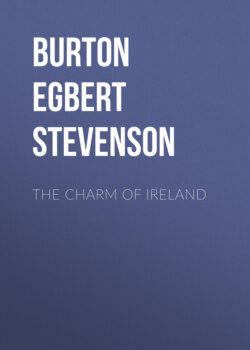Читать книгу The Charm of Ireland - Burton Egbert Stevenson - Страница 11
На сайте Литреса книга снята с продажи.
CHAPTER VII
ОглавлениеTable of Contents
HOLY CROSS AND CASHEL OF THE KINGS
If one doesn't like bacon and eggs, one must go without breakfast in Ireland, unless one likes fish, or is content with bread and butter. Every evening Betty would have a colloquy with the maid, which ran something like this:
"What will ye be wantin' for breakfast, miss?"
"What can we have?"
"Oh, anything ye like, miss."
"Well, what, for instance?"
"There's bacon and eggs, miss, and there's fish."
We usually took bacon and eggs, for fish seemed out of place on the breakfast-table. Besides, we were sure to encounter it later at dinner.
"And will ye have coffee or tay, miss?" the maid would continue.
We took coffee once, and after that we took tea. The tea is good, though strong, and it seems somehow to suit the climate; but one sip of Irish coffee will be enough for most people.
So next morning we sat down to our breakfast of tea and bacon and eggs with a good appetite. The cloth was not as clean as it might have been, but the eggs were fresh and the bacon sweet, and the bread and butter were delicious—as they are all over Ireland—and the tea tasted better than I had ever imagined tea could taste, and outside the sun was shining brightly, but no brighter than the face of the maid who waited on us, and there was a pleasant stir of movement up and down the street, for it was Saturday and market-day, so that it was quite impossible to be otherwise than happy and content. And presently the car I had arranged for the night before drove up, and we were off on the four-mile drive to the ruins of Holy Cross Abbey.
We had to go slowly, at first, for the street was crowded with people come to market, and with the wares exposed for sale. There were little carts heaped high with brown turf, which might be bought for two or three shillings a load, though every load represented as many days' hard work; there were red calves in little pens, and chickens in crates, and eggs and butter in baskets; and there were a lot of pedlars offering all sorts of dry-goods and hardware and odds and ends to the country-people who stood stolidly around, apparently rather sorry they had come. The faces were typically Irish—the men with short noses and shaved lips and little fuzzy side-whiskers, and the women with cheeks almost startlingly ruddy; but there wasn't a trace of those rollicking spirits which the Irish in books and on the stage seldom fail to display.
Once clear of the crowd, we rolled out of the town, over a bridge above the railway, and along a pleasant road, past little thatched cottages overflowing with children; meeting, from time to time, a family driving to town, all crowded together on a little cart behind a shaggy donkey, the men with their feet hanging down, the women scrooched up under their shawls, with their knees as high as their chins. They all stared at us curiously; but our driver passed them by with disdain, as not worth his notice, and from a word or two he let fall, it was evident that he considered them beneath him.
The road was rather higher than the surrounding country, and we could see across it, north and south, for many miles; then it descended to a winding stream, the Suir, flowing gently between rushy banks, and presently we saw ahead a great pile of crumbling buildings—and then we were at Holy Cross, one of the most exquisite and interesting of the hundreds of ruins which cover Ireland.
That word "hundreds" is no exaggeration. In a single day's journey, one will see scores; and as one goes on thus, day after day, one begins to realise what a populous and wealthy country Ireland was eight hundred years ago, how crowded with castles and monasteries; and I think the deepest impression the traveller bears away with him is the memory of these battered and deserted remnants of former grandeur. And yet it is not quite just to blame England for them, as most of the Irish do. It was the English, of course, who broke up the monasteries and destroyed many of the castles; but the march of the centuries would probably have wrought much the same ruin in the end; for men no longer live in castles, finding homes far pleasanter; and it is not now to monks they go for learning, nor is the right of sanctuary needed as it was in the time when might made right, and a poor man's only hope of safety lay in getting to some altar ahead of his pursuers. Yet one cannot tread these beautiful places without a certain sadness and regret—regret for the vanished pomp and ceremony, the cowled processions and torch-lit feasts, the shuffle of feet and the songs of minstrels—in a word, for the old order, so impressive, so picturesque—and so cruel!
